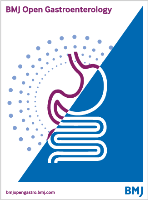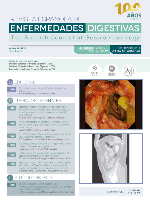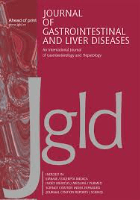
Gastrointestinal Disorders
Scope & Guideline
Empowering Professionals with Cutting-Edge GI Research
Introduction
Aims and Scopes
- Clinical Management of Gastrointestinal Disorders:
The journal consistently publishes research on the clinical management of a variety of gastrointestinal disorders such as inflammatory bowel disease, colorectal cancer, and liver diseases, focusing on treatment protocols, patient outcomes, and healthcare strategies. - Pathophysiological Mechanisms:
A significant emphasis is placed on understanding the underlying biological mechanisms of gastrointestinal diseases, including immune responses, microbiome interactions, and genetic predispositions. - Innovative Diagnostic and Therapeutic Approaches:
Research on novel diagnostic tools and therapeutic interventions, including endoscopic techniques, pharmacological treatments, and dietary modifications, is a core focus, aiming to enhance disease identification and management. - Public Health and Epidemiology:
The journal addresses broader public health issues, including epidemiological studies on gastrointestinal disorders, factors influencing disease prevalence, and health disparities among different populations. - Patient-Centered Research:
The inclusion of patient-reported outcomes, quality of life assessments, and studies focusing on patient education and self-management strategies highlights the journal's commitment to a patient-centered approach in gastrointestinal health.
Trending and Emerging
- Impact of Gut Microbiota on Health:
Research exploring the relationship between gut microbiota and gastrointestinal health, particularly its role in disease development and management, has gained significant traction, highlighting its importance in personalized medicine. - Neuroimmune Interactions and the Gut-Brain Axis:
Studies investigating the connections between the nervous system and gastrointestinal disorders, including the gut-brain axis, are increasingly prevalent, emphasizing the multidisciplinary approach to understanding these complex interactions. - Telemedicine and Digital Health in Gastroenterology:
The incorporation of telemedicine and digital health tools in managing gastrointestinal disorders has emerged as a critical area of exploration, especially in the context of the COVID-19 pandemic, reshaping patient care and accessibility. - Socioeconomic Factors and Health Disparities:
There is a growing focus on the impact of socioeconomic factors on gastrointestinal health outcomes, with research addressing disparities in access to care and disease prevalence among different demographics. - Personalized and Precision Medicine:
The trend towards personalized and precision medicine in treating gastrointestinal diseases is gaining momentum, with studies investigating genetic, epigenetic, and biomarker-driven approaches to therapy.
Declining or Waning
- Traditional Dietary Interventions:
Research centered on conventional dietary interventions for gastrointestinal disorders has diminished, possibly due to the increasing interest in personalized and microbiome-based dietary strategies. - Basic Science Investigations:
There has been a noticeable reduction in purely basic science studies without clear clinical implications, as the journal increasingly prioritizes research that bridges the gap between laboratory findings and clinical applications. - Longitudinal Studies on Rare Gastrointestinal Disorders:
The frequency of publications focusing on rare gastrointestinal conditions has waned, perhaps due to the challenges in recruiting sufficient patient populations for such studies. - Pharmacological Approaches with Established Therapies:
Studies focusing on well-established pharmacological treatments, particularly those with little innovation, have seen a decline as the journal shifts towards highlighting novel therapies and interventions.
Similar Journals

Gut and Liver
Pioneering research for a healthier tomorrow.Gut and Liver is a prestigious peer-reviewed journal dedicated to advancing the fields of Gastroenterology and Hepatology. Published by the EDITORIAL OFFICE GUT & LIVER in South Korea, this Open Access journal has been disseminating valuable research findings since 2007, making critical knowledge accessible to a global audience. With an impressive 2023 impact factor that places it in Q1 rank in both Gastroenterology (#28/167) and Hepatology (#22/82), it is recognized as a leader in the medical domain. The journal covers diverse topics, including innovative therapeutic strategies, clinical practices, and groundbreaking research in liver diseases and gastrointestinal disorders, thereby playing a vital role in improving patient care and outcomes. Researchers, healthcare professionals, and students can benefit from the journal's wealth of information, designed to foster collaboration and spark new ideas within the scientific community. For further engagement with current research, readers can access issues from 2009 to 2024 and stay updated on the latest advancements in the field.

BMJ Open Gastroenterology
Fostering Collaboration for Transformative Gastrointestinal CareBMJ Open Gastroenterology is a premier open access journal published by the esteemed BMJ Publishing Group, focusing on the dynamic and evolving field of gastroenterology. Established in 2014, the journal has rapidly ascended in stature, reflected in its impressive 2023 Q1 ranking in gastroenterology and its position within the top 25% of journals in the category according to Scopus. With a mission to disseminate high-quality, peer-reviewed research with global significance, the journal provides a vital platform for researchers, professionals, and students alike to share their findings and advancements in gastrointestinal medicine. Operating from its headquarters in London, England, the journal's open access format ensures wide visibility and accessibility of cutting-edge research, making it an invaluable resource for those dedicated to improving patient care and driving innovation in gastroenterological sciences. By engaging with this journal, contributors and readers can stay at the forefront of critical developments in the field, fostering a collaborative environment for knowledge exchange.

DIGESTIVE DISEASES
Elevating Knowledge in Digestive Diseases.DIGESTIVE DISEASES, published by KARGER, stands as a leading international journal dedicated to the field of gastroenterology and digestive health. With an ISSN of 0257-2753 and E-ISSN 1421-9875, the journal has been providing a platform for high-quality research since its inception in 1983, continuing to disseminate groundbreaking findings and insights through to 2024. Positioned in the second quartile (Q2) of both the gastroenterology and miscellaneous medicine categories as of 2023, DIGESTIVE DISEASES is recognized for its rigorous peer-review process and its contributions to advancing clinical and experimental gastroenterological knowledge. Its Scopus ranking at #62 out of 167 in the gastroenterology field reflects its significant impact, as it reaches a notable 63rd percentile among its peers. While it does not currently offer open access options, its subscription model ensures that vital research is available to professionals and institutions committed to the field. The journal serves as an essential resource for researchers, clinicians, and students alike who seek to deepen their understanding of digestive disorders and their implications in medicine.

JGH Open
Pioneering Open Access in Gastroenterology and HepatologyJGH Open is a prominent open-access journal dedicated to advancing knowledge in the fields of Gastroenterology and Hepatology, published by WILEY. Since its inception in 2017, the journal has served as a crucial platform for researchers, professionals, and students to disseminate innovative research findings and clinical insights. With an impact factor and Scopus rankings reflecting its steady growth—ranking in the 3rd quartile for both Gastroenterology (Q3) and Hepatology (Q3)—JGH Open is positioned within the competitive landscape of medicine. Its commitment to open access enhances the visibility and accessibility of high-quality research, ensuring that significant advancements in understanding diseases of the gastrointestinal tract and liver reach a broad audience. With a focus on collaboration and dissemination of knowledge, JGH Open aims to contribute to the global discourse and improve outcomes in gastrointestinal health.

Korean Journal of Gastroenterology
Empowering Clinicians with Cutting-Edge InsightsKorean Journal of Gastroenterology (ISSN: 1598-9992, E-ISSN: 2233-6869), published by the Korean Society of Gastroenterology, has been a premier outlet for research and advancements in the field of gastroenterology since its inception in 1968. This open-access journal, based in South Korea, fosters a global dialogue on gastrointestinal health, embracing contributions from a diverse array of disciplines within medicine. It is currently ranked in the Q4 quartile for miscellaneous medicine and holds a Scopus rank of #323 out of 636 in general medicine, reflecting its commitment to publishing impactful research despite its relatively recent establishment in high-impact metrics. With a continuous publication timeline extending through to 2024, the journal aims to enhance understanding of gastrointestinal disorders and promote innovative treatments, making it an essential resource for researchers, clinicians, and students alike who seek to stay abreast of the latest developments and clinical applications in gastroenterology.

REVISTA ESPANOLA DE ENFERMEDADES DIGESTIVAS
Transforming gastroenterology with cutting-edge research.REVISTA ESPANOLA DE ENFERMEDADES DIGESTIVAS, a pivotal Open Access journal published by ARAN EDICIONES, S A, has been at the forefront of advancing the field of gastroenterology since its inception in 1990. With a robust commitment to disseminating high-quality research, the journal provides a platform for researchers, clinicians, and students to share innovative findings and insights concerning digestive diseases. The journal is characterized by its Q3 ranking in both Gastroenterology and Miscellaneous Medicine categories, indicative of its significant contributions to these fields, and is positioned within the 36th percentile of Scopus rankings for medicine related to gastroenterology. Based in Spain, REVISTA ESPANOLA DE ENFERMEDADES DIGESTIVAS has embraced the Open Access model since 2004, ensuring that its articles are readily available to a global audience without financial barriers. The journal not only supports academic discourse but also plays a crucial role in improving clinical practices and health outcomes related to digestive health.

Gastroenterology Insights
Pioneering Research for Optimal Digestive WellnessGastroenterology Insights is a premier open-access journal published by MDPI since 2009, focusing on essential research and developments within the fields of gastroenterology and hepatology. With a dedicated ISSN of 2036-7414 and E-ISSN 2036-7422, this journal serves as a vital platform for disseminating innovative studies and insights pertinent to gastrointestinal health, disorders, and treatment modalities. Based in Switzerland, Gastroenterology Insights boasts a significant academic presence, currently positioned in the Q3 quartile for both gastroenterology and hepatology categories as of 2023, reflecting its impactful contributions to the disciplines. With Scopus rankings placing it at the 94th and 48th positions in gastroenterology and hepatology respectively, the journal is committed to advancing knowledge and fostering collaboration among researchers, professionals, and students alike. By providing an open-access model, it ensures that high-quality research is accessible globally, thereby enhancing the reach and impact of crucial findings in the science of digestive health. Researchers looking to publish cutting-edge work will find Gastroenterology Insights a valuable resource for both sharing and acquiring knowledge.

Indian Journal of Gastroenterology
Connecting Researchers and Practitioners in GastroenterologyThe Indian Journal of Gastroenterology, a prominent publication in the field of gastroenterology, is published by Springer India. With roots dating back to 1982 and an ongoing commitment to disseminating high-quality research, this journal serves as a vital platform for researchers, practitioners, and students interested in gastrointestinal health and diseases. It boasts an impressive track record with a Scopus rank of #82 in the gastroenterology category and a 2023 quartile ranking of Q3, firmly situating it within the competitive landscape of medical journals. Although it is not an open-access journal, the Indian Journal of Gastroenterology offers accessible research articles contributing significantly to the field, facilitating informed discussion and advancing knowledge in gastrointestinal medicine. The journal's comprehensive focus covers a wide range of topics from clinical studies to innovative therapeutic approaches, ensuring its relevance to current medical practices and the evolving challenges in gastroenterology.

Translational Gastroenterology and Hepatology
Unlocking Innovations for Liver and Gut Health.Translational Gastroenterology and Hepatology, published by AME Publishing Company, stands as a pivotal platform for advancing the understanding and treatment of gastrointestinal and liver diseases. With its focus on translational research, this journal aims to bridge the gap between laboratory discoveries and clinical applications, thus fostering improvements in patient care. Although specific metrics like H-Index and Scopus ranks are currently unavailable, the journal is committed to maintaining high standards of scholarly communication and excellence. As an open-access publication, it ensures that valuable findings are readily accessible to a global audience, promoting collaboration and innovation among researchers, clinicians, and healthcare professionals invested in gastroenterology and hepatology. The journal's dedication to disseminating groundbreaking research makes it an essential resource for those seeking to stay at the forefront of these ever-evolving fields.

Journal of Gastrointestinal and Liver Diseases
Driving Impactful Discoveries in Digestive HealthThe Journal of Gastrointestinal and Liver Diseases, published by MEDICAL UNIV PRESS in Romania, serves as a pivotal platform for the dissemination of significant research in the fields of gastroenterology and hepatology. Established in 2006, this journal has evolved over the years, currently holding a Q3 rank in Gastroenterology and a Q2 rank in Medicine (miscellaneous), reflecting its commitment to high-quality scholarship and impactful contributions to medical science.
With an ISSN of 1841-8724 and an E-ISSN of 1842-1121, the journal engages a diverse readership of researchers, clinicians, and students passionate about advancing knowledge in gastrointestinal and liver health. While it currently does not operate under an open access model, the journal remains a vital resource for those seeking to stay updated on the latest developments and emerging trends in the field. As it converges towards a broader impact, projected through its coverage until 2024, the Journal of Gastrointestinal and Liver Diseases continues to contribute to the academic landscape, encouraging innovation and comprehensive understanding in digestive health.